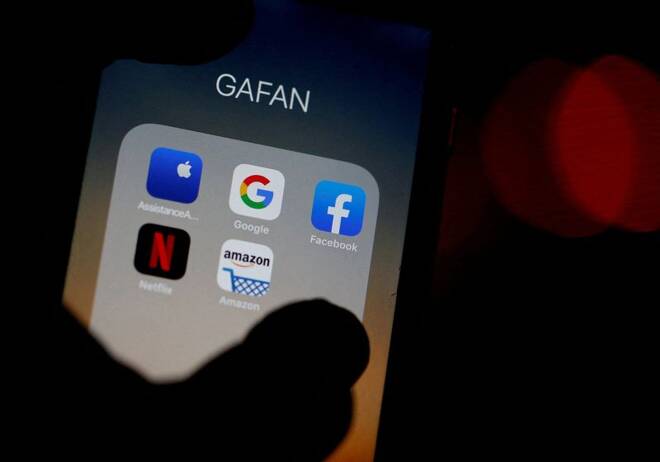Advertisement
Advertisement
EU riles Big Tech with telecoms network costs consultation
By:
By Foo Yun Chee BRUSSELS (Reuters) - The European Commission on Thursday launched a consultation on the future of Europe's telecoms sector, starting a process that could lead to requiring Alphabet's Google, Apple, Meta Platform and Netflix to pay some network costs.
By Foo Yun Chee
BRUSSELS (Reuters) -The European Commission drew criticism from Meta Platform and other Big Tech firms on Thursday with the launch of a consultation on who should foot the bill for billions of euros of investments in Europe’s telecoms network.
For more than two decades Deutsche Telekom, Orange, Telefonica, Telecom Italia and other operators have lobbied for leading technology companies to contribute to 5G and broadband roll-out.
They argue Alphabet’s Google, Apple, Meta, Netflix, Amazon and Microsoft account for more than half of data internet traffic.
The tech firms in response call it an internet tax that will undermine European Union network neutrality rules to treat all users equally. The 12-week consultation will end on May 19.
Meta, in its first public comments on the topic, said regulators should acknowledge Big Tech’s investments.
“Meta invests tens of billions of dollars in our apps and platforms every year to facilitate the hosting of content, creating enormous value across the digital ecosystem,” a spokesperson said.
“By not recognising that value flows both ways between telecoms companies and content-hosting platforms, this consultation is based on a false premise.”
EU industry chief Thierry Breton cited the heavy investments for 5G and broadband, saying he was not targeting any company.
“The burden of these investments is heavier and heavier. And that is in part because of a low return on investment in the telecoms sector, the increase of the cost of raw materials, and the world geopolitical context, the cost of energy, of course, because that has a big role to play,” he told a news briefing.
“All of this reflection isn’t aimed against anyone at all, rather it’s for our fellow citizens,” Breton said, adding that he was aware of time constraints in trying to wrap up the issue by the end of 2023.
“We hope to move very quickly so that in the summer we will be able to come back with conclusions and then we will see what we do to continue to make progress,” he said.
Breton said a contributions mechanism could be one of the solutions. Other options include a continental or digital levy or fund according to a document seen by Reuters last month.
Telefonica CEO Jose Maria Alvarez-Pallete said Big Tech is as much a customer as other users.
“This would not be like a tax, we would charge them like they were customers, why do some customers pay and others not. It’s correcting an anomaly,” he told Reuters.
Telecoms lobbying group ETNO echoed this, saying the consultation was an urgent step to address major imbalances, but the Computer & Communications Industry Association (CCIA) criticised the proposal in a statement.
“Europeans already pay telecom operators for internet access, they should not have to pay telcos a second time through pricier streaming and cloud services,” said Christian Borggreen, CCIA Europe’s senior vice president.
Any legislative proposal will need to be agreed with EU member states and EU lawmakers before it can become law.
(Reporting by Foo Yun Chee, additional reporting by Inti Landauro in Madrid and Hakan Ersen in Frankfurt; editing by Tomasz Janowski, Jason Neely and Alexander Smith)
About the Author
Reuterscontributor
Reuters, the news and media division of Thomson Reuters, is the world’s largest international multimedia news provider reaching more than one billion people every day. Reuters provides trusted business, financial, national, and international news to professionals via Thomson Reuters desktops, the world's media organizations, and directly to consumers at Reuters.com and via Reuters TV. Learn more about Thomson Reuters products:
Latest news and analysis
Advertisement
